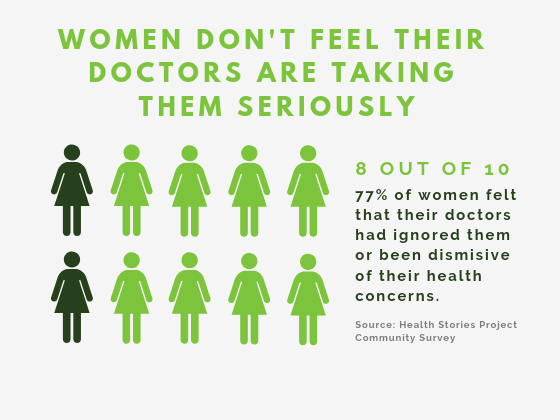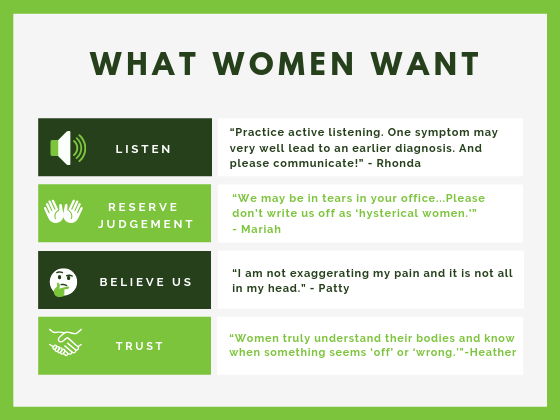On March 8th of every year, women around the world strike, get together, and speak out for continued advancements in gender equality including equal pay, reproductive autonomy, stopping sexual assault and expanding access to healthcare around the world. It’s an annual opportunity to reflect on areas that need attention and to raise awareness about issues that affect women.
Among the many issues that affect women globally, from the poorest countries to the richest, healthcare is one of the most critical. Improving women’s health makes societies stronger.
Countless women simply don’t feel like their doctors are taking them seriously.
We conducted a survey in honor of International Women’s day and 77% of respondents felt that their doctors had ignored them or been dismissive of their health concerns. This was true of both male and female doctors.



This type of neglect can have a profound impact on a woman’s health. Research shows that women are often under-prescribed pain medication. And when symptoms are written off, a misdiagnosis becomes more likely. In 2018, a number of celebrities opened up about their healthcare experiences, including a Vogue cover story with tennis superstar Serena Williams, who had a pulmonary embolism the day after an emergency c-section. Her persistence with dismissive medical professionals likely saved her life.
When we asked the women of the Health Stories Project community about their experiences and what they wanted people to know about their lives, the responses poured in. Many women included thoughts for healthcare providers in hopes that perhaps they’ll listen and learn.
Read more of their words below.
Women know their bodies.
“A person, woman or man, knows their body better than a physician! Everybody’s body reacts differently to illness and disease so physicians need to work with the patient to achieve health, not against them.” – Robin (fibromyalgia, migraines, rheumatoid arthritis, lupus)
“Women truly understand their bodies and know when something seems ‘off’ or ‘wrong.’ [Doctors should] take the time to listen to their symptoms and the effects they have on their lives. Don’t dismiss so quickly and offer any and all types of testing to make sure all bases are covered. A holistic view of health would be beneficial for everyone suffering.” – Heather (anxiety, depression, fibromyalgia, premenstrual dysmorphic disorder, autoimmune disease).
“Women know their bodies best. Years of menstrual cycles tell us more than a degree can tell you.” – Ronnie (endometriosis, PMDD, uterine fibroids, rheumatoid arthritis).
Judgment isn’t helpful.
“Too many doctors ignore symptoms or quickly dismiss them to talk about how if we would just lose weight, everything would be resolved. Don’t rush to judgment.” – Anonymous (primary biliary cholangitis, depression, polycystic ovary syndrome)
“We may be in tears in your office due to severe anxiety or depression beyond our control. Please don’t write us off as ‘hysterical women.'” – Mariah (anxiety, depression, psoriasis)
“I get judged because I have a full sleeve of tattoos and wear dark eyeliner and have long hair that’s black.” – Victoria (anxiety, bladder control issues, depression, endometriosis, stroke, Crohn’s)



Believing women is important.
“I am not exaggerating my pain and it is not all in my head.” – Patty (anxiety, depression, fibromyalgia)
“Yes, I’m a female but that does not mean I’m a hysteric. Please, listen to me and take all my feelings and symptoms together before you dismiss me as a nut job.” – Shirley (anxiety, breast cancer, high blood pressure, depression, stroke)
“Living with uncertainty is tough. We’re not crazy but our conditions change from day to day. Noticing these changes means we understand our bodies and are taking responsibility for our health.” – Christa (anxiety, mixed connective tissue disease, RA, lupus)
Two-way communication is an essential part of healthcare.
“Practice active listening. One symptom may very well lead to an earlier diagnosis. And please communicate! The [doctor’s online] patient portal is encouraged but a hassle when I have to email several times to get an answer.” – Rhonda (osteoarthritis, TMD, dyspareunia, endometriosis)
“Just listen. It’s not attention-seeking. Don’t make assumptions. There’s a working brain in my body.” – Danita (anxiety, depression, high blood pressure)
“We are hurting and doctors need to take us seriously, not just prescribe us drugs but help us understand what is wrong and to empower us to get better.” – Sandy (fibromyalgia)
- Living with Alzheimer’s disease
- “A Hot MS” Celebrates the Everyday Disasters That Shape Patients’ Lives
- Breast Cancer, Surgery & Recovery: There’s Nothing “Routine” About It
- “It’s OK to Not Be a Superhero”
- From “Damaged Goods” to Small Victories: Growing Up with Mental and Physical Health Conditions


This is a wonderful resource for women.
Hopefully enough women will post their request for new rules for voicing our rights to make decisions with doctors when it concerns our individual needs. We know our bodies and we know when the medicine is not healing our systems. Treating the thyroid is one that really needs to be changed
This was not too embarrasing.
Some surveys are just tooo long, just tooo many questions. This was just right…
Thank you, Louise frontz
As a retired critical care RN, I have both seen & experienced the attitude of Drs towards women patients. When Ibuprofen first came on the market & I requested a Rx for severe debilitating menstrual cramps my Dr told me that he really didn’t think it worked that well. I told him I wanted the Rx & that I would be the judge of how well it works. And it did! And I have seen women with symptoms of cardiac disease which are different from men’s symptoms & been told that it’s GI, hormones, all in your head only to suffer massive heart attacks often leading to death because no one would listen. It’s frustrating because supporting evidence is out there. 4yrs ago I was diagnosed with Myasthenia Gravis, an autoimmune neuromuscular disease. I was fortunate enough to be diagnosed immediately but MANY of the women I have met have gone as long as 10yrs w/o a proper diagnosis. They are said to be neurotic, attention seeking,hormonal,crazy, & any number of other things – mainly because they are women!!!?
I’d love to share my story about living with chronic pain and fatigue and how it affects my life and my family. I was a registered nurse so I have been on both ends of the healthcare spectrum and I think I can definitely provide some insight for healthcare providers and the general public. I would love to share my thoughts about the restrictions on pain medications as someone who has been on both sides. I had to finally leave my job as a nurse because of my disabilities and I want to feel like I am being productive and serving a purpose to improve the lives of people like me.
I need to keep up with new help. I enjoyed this.
Strong family history of breast cancer, I make sure to get a mammogram every year. 2020-covid got my dr to send referral because I had a lump, told the person doing the mammo, asked if I saw dr stated no way to get in with vivid restrictions. She did mammogram all is ok. 5 months later finally got appt with pcp ultrasound, biopsy, stage 2 invasive ductal carcinoma
I have Rheumatoid Arthritis and I’m a breast cancer survivor,started having hot flashes after my chemo and radiation treatments so anything at this point would help. So if you could help in anyway I would appreciate it thank you